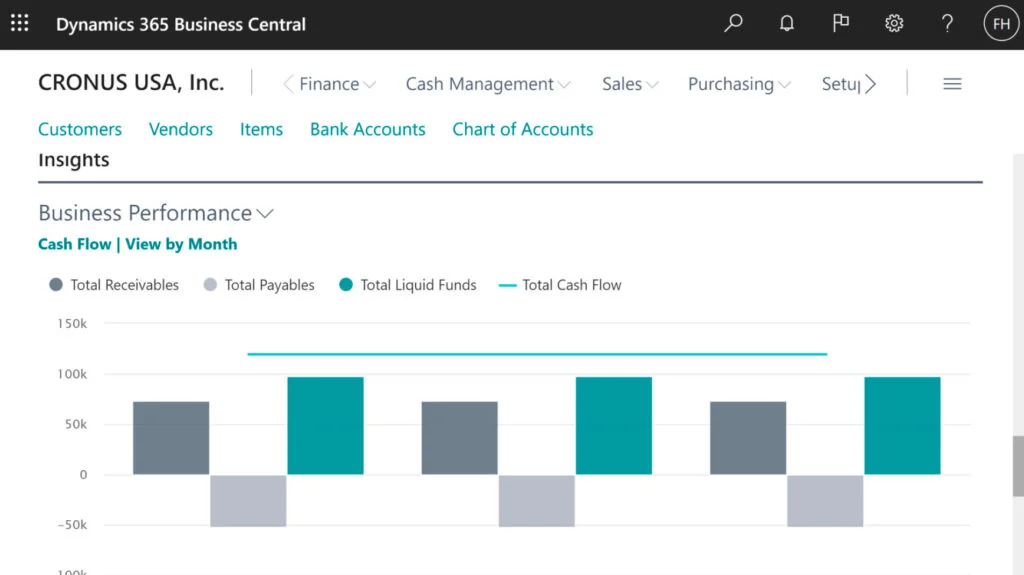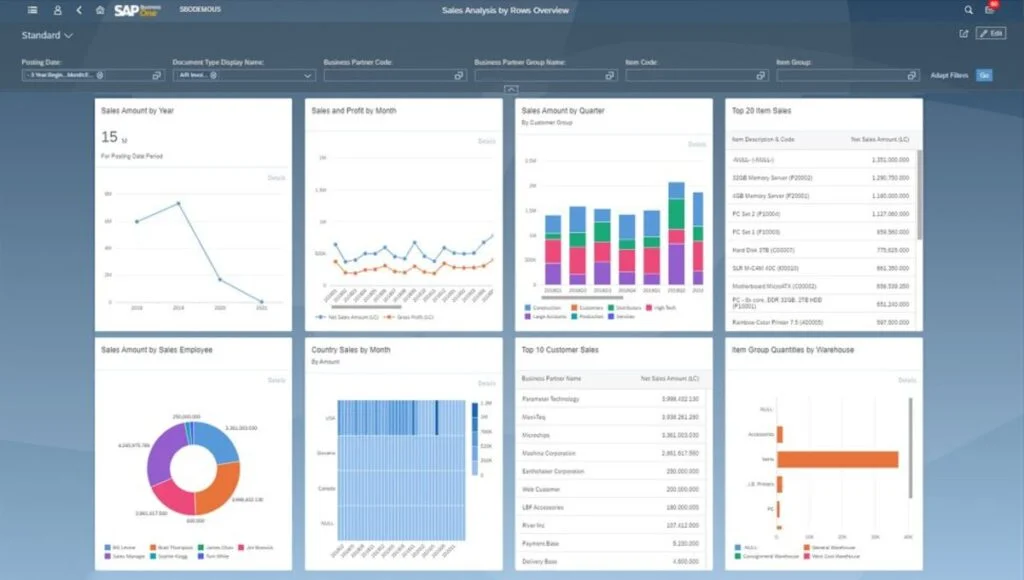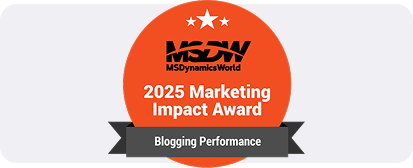Microsoft Dynamics 365 Business Central vs SAP Business One (2023 Comparison)
"If you are a small or mid-sized business owner looking for a powerful and flexible ERP solution, this blog is worth a read. Compare SAP Business One and Microsoft Dynamics Business Central offering a range of functionalities to help you streamline your operations and enhance productivity. And find out which one is best for your company."
You need help in making it easy for you to find the right ERP system for your business, right? That's understandable because, with so many options out there, it can be challenging at times to choose that one ERP solution which fits your business needs.
Don't get so worked up or overwhelmed by the abundance of information around you. The team of certified Microsoft consultants at Dynamics Square can help you escape this conundrum.
In this blog, we'll be comparing two of the most popular cloud-based ERP solutions on the market: Microsoft Dynamics 365 Business Central and SAP Business One.
Keep on reading more, and explore!
Want to see Dynamics 365 Business Central in Action: Book a FREE Demo
What is Dynamics 365 Business Central?
Microsoft Dynamics Business Central is designed and developed to run on cloud and on-premises. But primarily, it is a cloud ERP solution for small to mid-sized businesses (SMBs).

This cloud enterprise resource planning software offers functionalities such as financial management, supply chain management, inventory management, project management, customer relationship management, services, customer relations, and added features for extra fee.
You can watch this video to learn about Business Central:
Business Central is popular for its ease of use, flexibility, and integration capabilities, including seamless integration with other Microsoft products like Office 365 and Power BI.
In addition to that, this unified cloud platform allows customization. Which means, businesses can extend its power with third-party apps and add-ons from Microsoft AppSource.
What is SAP Business One?
SAP Business One is an all-in-one ERP platform for small to mid-sized enterprises (SMEs) and offers similar functionalities to Business Central.
The functionalities of SAP B1 include financial management, sales and customer management, purchasing and operations, inventory and distribution, and reporting and analytics.

This ERP software is also a cloud-based ERP solution and is known for its powerful capabilities to manage your company’s finances at scale like cost accounting and fixed assets management.
And like Dynamics 365 Business Central, you can customize SAP B1, and extend it for your intelligent enterprise with add-ons from the SAP Store.
What is the core difference between Microsoft Dynamics Business Central and SAP Business One?
Both Business Central and SAP Business One are an all-in-one ERP platform for SMBs with scalable capabilities, but like any product on the market these two have significant differences.
Let's see their core differences in the comparison table based on the findings of Trust Radius -
| Product Features | Microsoft Dynamics 365 Business Central Score 8.5 out of 10 | SAP Business One Score 8.1 out of 10 |
Pricing Model: Editions & Modules | Is a FREE trial available? YES, Essentials Module – Starting at CAD 89.60 per user/month, Premium Module – From CAD 128 per user/month, Team Members Module – CAD 10.20 per user/month | Is a FREE trial available? YES, Limited Edition – At CAD 132.30 per month, Starter Edition – At CAD 147.01 per month, PRO Edition – CAD 176.41 per month |
| Entry-level Setup Fee | NO | NO |
Top Pros | Functionalities of Dynamics NAV and an easy upgrade from NAV to Business Central Integrations with other Dynamics 365 Apps. Seamlessly assimilates with Microsoft Productivity Apps like Office 365, Power BI, Microsoft Loop, Viva Sales, and other third-party add-ons | Functionalities of SAP Business Easy to user interface Inventory management |
| Payroll Management: pay calculation, benefit plan administration, direct deposit files | Score on Trust Radius – 7.6 out of 10 | Score on Trust Radius – 10.0 out of 10 |
| Customization: API for custom integration, plug-ins | Score – 8.0 out of 10 | Score – 5.5 out of 10 |
| Security: Single sign-on capability, role-based user permission | 9.1 score out of 10 | 8.6 score out of 10 |
| Reporting and Analytics: Dashboards, standard reports, custom reports | Score 5.6 out of 10 | Score 7.1 out of 10 |
| General Ledger and Configurable Accounting: Accounts payable, accounts receivable, global financial support, primary and secondary ledgers, journals and reconciliations, configurable accounting, standardized processes | 8.8 score out of 10 on | 5.3 score out of 10 |
| Inventory Management: Inventory tracking, automatic reordering, location management | Score 8.7 out of 10 | Score 8.3 from 10 |
| Order Management: Pricing, order entry, credit card processing, cost of goods sold, order orchestration | Score 8.0 out of 10 | Score 7.6 out of 10 |
| Subledger and Financial Process: Billing management, revenue recognition, cash & assessment, travel and expense management, budgetary control & encumbrance accounting, period close | 8.4 score out of 10 | 6.6 score out of 10 |
| Project Financial Management: Budgeting & forecasting, project costing, cost capture, capital project management, customer contract compliance, project revenue recognition | Score 8.7 out of 10 | Score 7.4 out of 10 |
| Project Execution Management: Project planning and scheduling, task insight for project managers, project mobile functionality, project candidate search, definable resource pools, talent profiles, absence management | Score 7.7 out of 10 | Score 9.1 out of 10 |
| Grants Management: Award Lifecycle Management, spending control, indirect cost management | Score 9.7 out of 10 | Score 7.7 out of 10 |
| Procurement: Bids analysis & comparison, catalog shopping eCommerce for employees, contract authoring, contract renewal automation, contract repository, requisitions-to-purchase orders integrated, supplier management | 8.0 score out of 10 | 8.3 score out of 10 |
| Risk management: Risk repository, control management, control efficiency assessments, issue detection, remediation & certification | Score 9.6 out of 10 | Score 8.1 out of 10 |
| Logistics: Transportation planning & optimization, transportation execution management, trade & customs management, fulfillment management, warehouse workforce management | 7.7 score out of 10 | 7.4 score out of 10 |
| Manufacturing: Production process design, production management, configuration management, work execution, manufacturing costs | Score 7.1 out of 10 | Score 8.3 out of 10 |
| Supply Chain: Forecasting, inventory planning, performance monitoring | 9.5 score out of 10 | 7.9 score out of 10 |
| Product Lifecycle Management: Proposal management, product master data management | Score 9.3 out of 10 | Score 9.8 out of 10 |
Is SAP Business One better than Business Central?
Both SAP Business One (or SAP B1) and Microsoft Dynamics 365 Business Central are popular for enterprise resource planning (ERP).
These software solutions are designed to help businesses of every size (especially SMBs and organizations with less complex set of operations) to manage their finances, operations, customer relationships, and other repetitive tasks that take a serious amount of time and resources.
While both business management platforms have their own unique strengths, determining which one is better for your business needs depends on several factors.
So, here are some factors that may primarily influence your decision to choose between SAP Business One with D365 Business Central:
Comprehensive Business Solution: SAP Business One is known for offering comprehensive reporting, customization, and financial features compared to Business Central.
Customization: SAP Business One is praised by users across industries for its configurability, ease of use, and ability to streamline processes and improve efficiency. Whereas, the Microsoft Dynamics Business Central is preferred by the companies to do more with less in all aspects of business management.
Integration with Other Apps: Microsoft Dynamics Business Central is known for its integrative capabilities and user-friendly interface (an intuitive UI).
Sturdiness: Business Central has AI capabilities (like GPT4-based Copilot for D365 BC for speedy collaboration and report sharing) for more meaningful insights that enable informed decision-making. Its sturdy project management module facilitates better budget and resource management for small to medium size enterprises (SMEs).
And the list goes on . . .
The crux of which ERP application among SAP B1 and Business Central is better for your business depends on many influencing factors. So, when choosing between the two platforms, it's important to consider your specific business needs and goals, as well as the features and capabilities that impact your operations.
And it is recommended to talk to your CRM/ERP software consulting providers like Dynamics Square to get a better sense of each platform's strengths and weaknesses.
What are the disadvantages of SAP Business One compared to Business Central?
SAP B1 and Microsoft Business Central are popular across industries and have their own advantages and disadvantages. Here are the main disadvantages of deploying SAP Business One against Business Central:
Limited Scalability: While SAP Business One is for SMEs, it may not be the best fit for organizations with a larger workforce that require more complex features or customization.
Less Deployment Options: SAP B1 can be implemented on-premises or via cloud hosting, but it has limited cloud deployment options compared to Dynamics 365 Business Central ERP, which is a true cloud-based solution from Microsoft. Get in touch with your Dynamics 365 partner in Canada for Business Central implementation and its deployment cost.
Strict Industry-Specific Features: While SAP Business One has core financials, sales, purchasing, inventory, production, and project management functionality, it may not have as many business-specific features as Business Central does. D365 BC has a wider range of industry-specific solutions to cope with evolving needs.
Higher Implementation costs: SAP Business One may require more customization and implementation effort than Business Central, which can be implemented at a low cost and with no added costs for continuous updates and maintenance since Microsoft handles everything.
Steeper Learning Curve: With SAP Business One, a user has a higher learning curve than Business Central, which can be quite difficult for inexperienced users to spin their heads around learning the software and get up to speed quickly.
Note: Every organization must carefully evaluate its needs before choosing any ERP solution since it costs a ton of money at once. Talk to our Business Central Experts for immediate help.
Frequently Asked Questions: FAQs
Q-1. Which one is better - Business Central or SAP Business One?
The user interface of SAP Business One is complicated and not user-friendly, which can make it challenging to understand and use. In contrast, Microsoft Dynamics 365 Business Central is relatively more flexible and easier to use, with a browser-based interface that is more intuitive than SAP.
Q-2. Is Dynamics 365 Business Central more powerful than SAP Business One?
Microsoft Dynamics 365 Business Central offers several advantages over SAP Business One, including flexibility, scalability, lower implementation and ownership costs, and is a suitable replacement for it.
Q-3. D365 Business Central vs. SAP Business One: Which One is Right for You?
Companies that prioritize CRM may find Business Central more suitable than SAP Business One, while companies focused on inventory, production, and financial needs may benefit more from SAP Business One, which offers robust functionalities across core functional areas.
Q-4. What are the security features of Business Central and SAP B1, and how do they compare?
Both Microsoft Dynamics 365 Business Central and SAP Business One include security features such as data encryption, backup encryption, continuous leak detection, and an information security management system. However, Dynamics 365 Business Central has multiple Security and Protection features such as Database Security, Company Security, Object Security, Record Security, and Cloud Security, which make it stand out from SAP Business One.
Q-5. Can Dynamics 365 Business Central be integrated with SAP B1?
No. But Microsoft Dynamics 365 Field Service can be integrated with SAP systems, including C-4Hana and S-4Hana, to connect your work operating system to your current ERP system. Microsoft also offers instructions for connecting SAP Industry-Specific Utility modules with Field Service. It should be noted that Microsoft and SAP are now partners to exchange technology in order to help businesses of all sizes thrive.
Get in touch with your Dynamics 365 Business Central Implementation Partner like Dynamics Square for smooth deployment and needed support of any kind.
Wrapping Up!
To wrap up this comprehensive article, it is clear that the comparison between Microsoft Dynamics 365 Business Central and SAP Business One clearly highlights the strengths and weaknesses of each system.
And it is also clear that SAP B1 is a powerful ERP solution with deep functionality across core functional areas, but it has a steeper learning curve and higher implementation costs that do not favor every organization.
On the other hand, Microsoft Dynamics 365 Business Central offers greater flexibility, scalability, and lower implementation and ownership costs, with a user-friendly interface that is more intuitive than SAP.
Hence, the ultimate choice between these two systems depends on the specific needs of your business, with factors such as CRM priorities, industry-specific features (like you can go for D365 BC for Supply Chain and SAP B1 for Manufacturing), and security needs playing a crucial role in making a better decision.
But the good news is that both solutions have their own unique strengths and can provide significant benefits to SMEs and large-sized enterprises alike. So, it is up to you and your business operations' complexity that will decide the best fit. Thus, it is recommended to talk to your cloud solution provider (CSP) like Dynamics Square.



